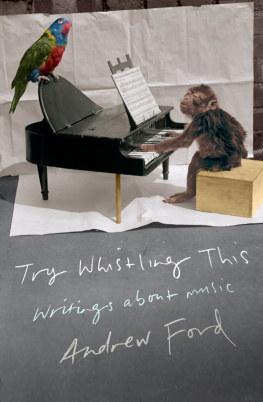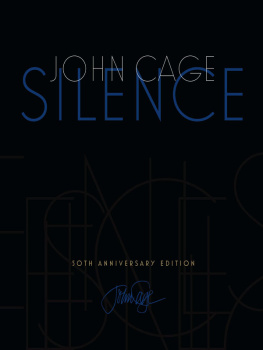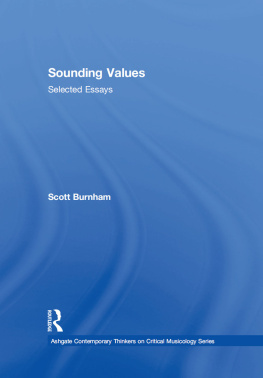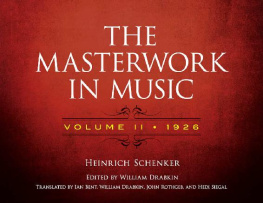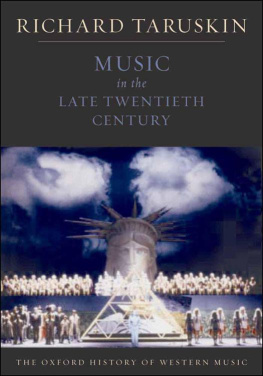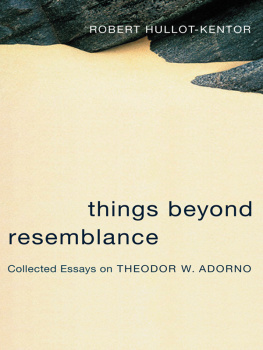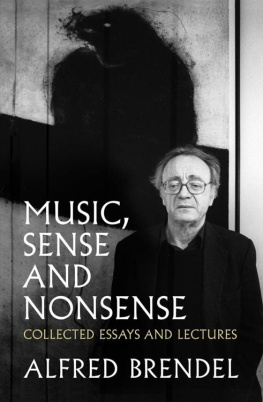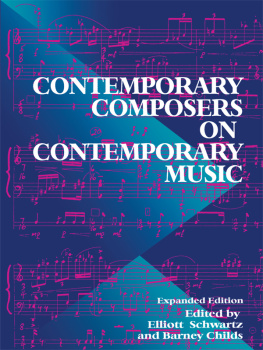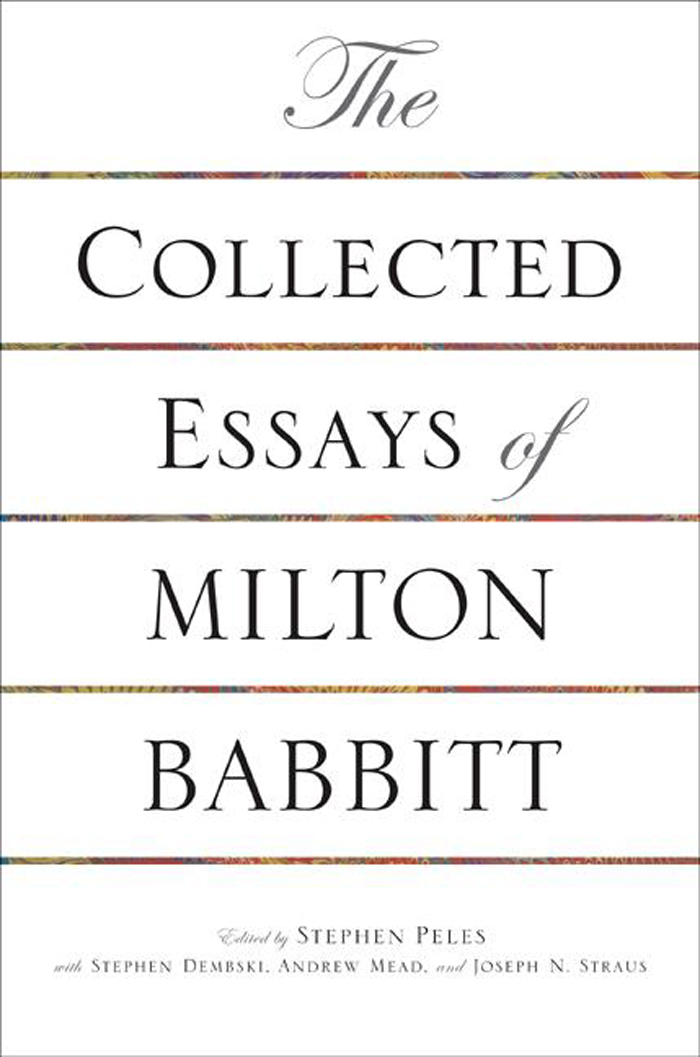THE COLLECTED ESSAYS OF
MILTON BABBITT
THE COLLECTED ESSAYS OF
MILTON BABBITT
Edited by Stephen Peles
with Stephen Dembski, Andrew Mead, and Joseph N. Straus
PRINCETON UNIVERSITY PRESS
PRINCETON AND OXFORD
COPYRIGHT 2003 BY PRINCETON UNIVERSITY PRESS
PUBLISHED BY PRINCETON UNIVERSITY PRESS, 41 WILLIAM STREET,
PRINCETON, NEW JERSEY 08540
IN THE UNITED KINGDOM: PRINCETON UNIVERSITY PRESS,
3 MARKET PLACE, WOODSTOCK, OXFORDSHIRE OX20 1SY
ALL RIGHTS RESERVED
LIBRARY OF CONGRESS CATALOGING-IN-PUBLICATION DATA
BABBITT, MILTON, 1916
[ESSAYS]
THE COLLECTED ESSAYS OF MILTON BABBITT / EDITED BY STEPHEN PELES... [ET AL.].
P. CM.
INCLUDES BIBLIOGRAPHICAL REFERENCES AND INDEX.
ISBN 0-691-08966-3 (ACID-FREE PAPER)
1. MUSICHISTORY AND CRITICISM. I. PELES, STEPHEN. II. TITLE.
ML60.B12 2003
780DC21
2003044496
BRITISH LIBRARY CATALOGING-IN-PUBLICATION DATA IS AVAILABLE
THIS BOOK HAS BEEN PUBLISHED WITH THE GENEROUS SUPPORT OF THE
PRINCETON UNIVERSITY DEPARTMENT OF MUSIC.
THIS BOOK HAS BEEN COMPOSED IN SABON.
PRINTED ON ACID-FREE PAPER.
WWW.PUPRESS.PRINCETON.EDU
PRINTED IN THE UNITED STATES OF AMERICA
1 3 5 7 8 9 8 6 4 2
CONTENTS
Review of Le Systme
Dodcaphonique (1950)
Tintinnabulation of the Crochets
(Review of Halsey Stevens, The Life and Music of Bartk) (1953)
Past and Present Concepts of the Nature
and Limits of Music (1961)
Twelve-Tone Rhythmic Structure and
the Electronic Medium (1962)
Reply to George Perles
Babbitt, Lewin, and Schoenberg: A Critique (1963)
The Synthesis, Perception, and Specification
of Musical Time (1964)
Contribution to The Composer in Academia:
Reflections on a Theme of Stravinsky (1970)
Contemporary Music Composition and Musical Theory
as Contemporary Intellectual History (1972)
Introduction to Marion Bauer,
Twentieth Century Music (1978)
Stravinskys Verticals and Schoenbergs Diagonals:
A Twist of Fate (1987)
ACKNOWLEDGMENTS
Relata
By Milton Babbitt
Copyright 1965 (Renewed) by Associated Music Publishers, Inc. (BMI).
International Copyright Secured. All Rights Reserved.
Reprinted By Permission.
String Quartet No. 4
By Arnold Schoenberg
Copyright 1939 (Renewed) by G. Schirmer (ASCAP).
International Copyright Secured. All Rights Reserved.
Reprinted By Permission.
String Quartet No. 4
By Bla Bartk
Copyright 1929 for the USA by Boosey and Hawkes, Inc. Copyright
Renewed.
Reprinted by permission.
String Quartet No. 5
By Bla Bartk
Copyright 1936 for the USA by Boosey and Hawkes, Inc. Copyright
Renewed.
Reprinted by permission.
Movements
By Igor Stravinsky
1960 by Hawkes and Son (London) Ltd. Copyright Renewed.
Reprinted by permission.
Arnold Schoenberg, Ode to Napoleon, used by permission of Belmont Music Publishers Pacific Palisades CA, 90272.
Arnold Schoenberg, Piano Piece Op. 23, No. 3, 1923 by Edition Wilhelm Hansen A/S, Copenhagen. Used by permission.
The String Quartets of Bartk, Musical Quarterly 35: 37785, 1949, and Twelve-Tone Invariants as Compositional Determinants, Musical Quarterly 46, no. 2: 24659, 1960. Used by permission of Oxford University Press.
Past and Present Concepts of the Nature of Limits of Music, International Musicological Society: Report of the 8th Annual Congress (New York, 1961), vol. 1, ed. Jan LaRue (Basel, London, and New York: Barenreiter, 1961, 398403. Used by permission.
Set Structure as a Compositional Determinant and An Introduction to the RCA Synthesizer reprinted by permission of the Journal for Music Theory.
Twelve-Tone Rhythmic Structure and the Electronic Medium, Since Schoenberg, Remarks on the Recent Stravinsky, contribution to Stravinsky: A Composers Memorial, Responses: A First Approximation, reply to George Perles Babbitt, Lewin, and Schoenberg: A Critique, I Remember Roger, On Having Been and Still Being an American Composer, reprinted by permission of Perspectives of New Music.
The Synthesis, Perception, and Specification of Musical Time, reprinted courtesy of the International Council for Traditional Music.
The Structure and Function of Music Theory, 1965 The College Music Society. Used by permission. Contribution to The Composer in Academia: Reflections on a Theme of Stravinsky, 1970 the College Music Society. Used by permission.
Contribution to In Memoriam Mtys Seiber and Brave New Worlds reprinted by permission of The Musical Times Publications, Ltd.
Introduction to Marion Bauer Twentieth Century Music, reprinted by permission of DaCapo Press.
Preface to David Epstein Beyond Orpheus: Studies in Musical Structure, 1979 MIT Press. Used by permission.
All the Things They Are: Comments on Kern, 1985 Institute for Studies in American Music. Used by permission.
Contribution to Memoirs. Hans Keller: A Memorial Symposium, 1986 Music Analysis, Blackwell Publications. Used by permission.
Stravinskys Verticals and Schoenbergs Diagonals: A Twist of Fate, in Stravinsky Retrospectives, 1987 University of Nebraska Press. Used by permission.
My Vienna Triangle at Washington Square, Revisted and Dilated, from Driven into Paradise: The Musical Migration from Nazi Germany to the United States, ed. Reinhold Brinkmann and Christoph Wolff (Berkeley: University of California Press), 3353. Used by permission.
PREFACE
Of American composers of the postwar era few have had a more profound influence on the course of the music of that time than Milton Babbitt. Surely none of equivalent musical stature has so consistently committed his thought to print, and the remarkable series of texts produced by Babbitt over that half-century rank among the most influential, widely discussed, and often misunderstood of the period.
As recognition of Babbitts prominence among the intellectuals of his generation has grown over the years, so has the interest of these essays extended far beyond the boundaries of the community of composers and theorists who were their earliest readers. The present volume is thus intended to meet what has become a long-standing need, by making available to cultural historians, musicologists, music theorists, composers, and others the complete writings of this seminal American thinker. To that end we have excluded little, save such unavoidable but comparatively insignificant by-products of the composerly life as the humble program note, as well as those essays which have appeared in substantially identical form under different titles; neither have we included Babbitts unpublished 1946 dissertation The Function of Set Structure in the Twelve-Tone System (Ph.D. dissertation: Princeton, 1992) or Words About Music: The Madison Lectures (Stephen Dembski and Joseph N. Straus, eds., [Madison: University of Wisconsin Press, 1987]). Apart from these we have included all that was available at the time we began the project, an average of almost one article for each of the fifty years of work represented. Not a few of the essays originally appeared in what some readers might think to be unlikely places, and most have long been out of print. Doubtless there will be something new here even for Babbitt scholars.
In the pages to follow the reader will encounter Babbitt in the dual role of maker of history and witness to history, and a considerable history it has been. Schoenberg, Steuermann, Stravinsky, Weisse, Krenek, and a host of other Europeans share the stage with Babbitts American colleagues too numerous to mention here; Babbitt knew them all, and woven through these often dauntingly theoretical texts is a unique eyewitness account of one of the most turbulent and exciting periods of American musical history, an account that emerges more poignantly as the essays are read


